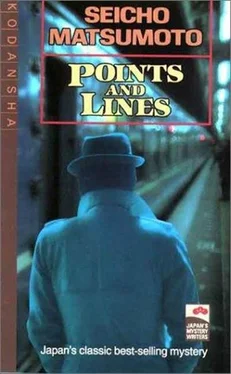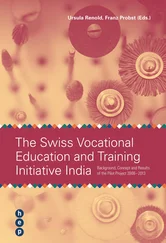Seichō Matsumoto - Points And Lines
Здесь есть возможность читать онлайн «Seichō Matsumoto - Points And Lines» весь текст электронной книги совершенно бесплатно (целиком полную версию без сокращений). В некоторых случаях можно слушать аудио, скачать через торрент в формате fb2 и присутствует краткое содержание. Жанр: Детектив, на английском языке. Описание произведения, (предисловие) а так же отзывы посетителей доступны на портале библиотеки ЛибКат.
- Название:Points And Lines
- Автор:
- Жанр:
- Год:неизвестен
- ISBN:нет данных
- Рейтинг книги:5 / 5. Голосов: 1
-
Избранное:Добавить в избранное
- Отзывы:
-
Ваша оценка:
- 100
- 1
- 2
- 3
- 4
- 5
Points And Lines: краткое содержание, описание и аннотация
Предлагаем к чтению аннотацию, описание, краткое содержание или предисловие (зависит от того, что написал сам автор книги «Points And Lines»). Если вы не нашли необходимую информацию о книге — напишите в комментариях, мы постараемся отыскать её.
Points And Lines — читать онлайн бесплатно полную книгу (весь текст) целиком
Ниже представлен текст книги, разбитый по страницам. Система сохранения места последней прочитанной страницы, позволяет с удобством читать онлайн бесплатно книгу «Points And Lines», без необходимости каждый раз заново искать на чём Вы остановились. Поставьте закладку, и сможете в любой момент перейти на страницу, на которой закончили чтение.
Интервал:
Закладка:
So Yasuda was on the Towada, as he had declared! Mihara did not know what to think. The further he investigated, the more evidence accumulated that Yasuda was telling the truth.
Mihara buried his head in his hands. The chief interrupted his thoughts. "By the way, Mihara, do you believe it was Yasuda who sent that wire?"
"What?" Mihara raised his head.
"Remember saying that you'd like to know who might have sent the telegram for Yasuda? A stand-in, perhaps…"
Mihara stared at Chief Kasai. "Of course. I had forgotten."
"You shouldn't forget your own words." The chief was laughing quietly.
Mihara picked up the telephone and called Ueno Station. He asked to be connected with the train conductors' office.
"Hello! The conductor on the Towada express on duty between Sendai and Aomori: to which division would he belong?"
"He would work out of Ueno."
Mihara took a police car and hastened to Ueno Station. In the office he questioned the official on duty.
"No. 205, the Towada, on January 20 of this year, is it? Just a minute, please." The man consulted the duty records.
"Kajitani was the conductor. He should be around today. I'll have him called."
"Please do so." Mihara waited with mounting excitement.
The conductor presently arrived. He was not over thirty and looked intelligent. "Let me see. I don't remember the contents of the telegram but I do recall being asked to send one to Sapporo. That must have been from Kominato Station, near Asamushi. I believe it was the morning of January 21. I don't remember sending any other telegrams for passengers from up north."
"Do you recall the face of the passenger who gave it to you? Anything at all about him?" Mihara hoped the conductor would remember some detail.
"Let me see. It was a passenger in a second class sleeper."
"Yes."
"I believe he was tall and rather slim."
"What, slim? Quite sure he wasn't stout?" Mihara was secretly pleased but repeated the question to make certain.
"No, certainly not stout. I'd say he was thin." The conductor's memory seemed to be clearing. "It was a party of two."
"Two people?"
"I'm sure because I was checking the tickets. The man was holding his companion's ticket as well. No, not exactly a companion; the other man seemed more like his superior. He looked important. The slim man spoke to him very politely."
"Then it was the subordinate who asked you to send the wire?"
"Yes."
Tatsuo Yasuda's substitute was now clear. There was no possible mistake. The senior individual was Division Chief Ishida of X Ministry. The subordinate must have been the official traveling with him.
Until this moment, Mihara had taken for granted that Ishida had been traveling alone. But it was natural for a person in Ishida's position to be accompanied by a member of his staff.
Mihara went to the X Ministry to ascertain who had accompanied Division Chief Ishida on his trip to Hokkaido on January 20. He learned that it was Kitarō Sasaki. This was the same man who had visited the Metropolitan Police Board some days before on instructions from Ishida to inform Chief Kasai that Tatsuo Yasuda had been aboard the Marimo.
Mihara flew to Aomori the following day. He checked the passenger lists of all Sei-kan ferries on January 21. Ishida and Yasuda's names were there; Sasaki's name was not. It was clear that Sasaki had boarded the ferry using Yasuda's name.
The towering wall in front of Mihara had begun to crumble. At long last victory was in sight.
All he needed now was to find how Yasuda's signature came to be on the passenger list. Having come this far, that should not be difficult.
13 Mihara's Reply
Dear Mr. Torigai:
The weather is very hot. Walking in the scorching sun, one's shoes get stuck in the soft asphalt. All day I keep looking forward to the cold shower and the glass of cold beer that await me when I return home from work. I remember, almost with pleasure, the day you took me to Kashii Beach and I stood shivering in the cold wind that blew in from the Sea of Genkai.
Not for a long time have I been able to write a letter in so relaxed a mood. It was last February when we first met in Hakata. Seven months have gone by since I stood with teeth chattering on Kashii Beach and listened to your story. Ever since that time, my mind has been absorbed by the case and I have been unable to rest. Today, at long last, I am at peace; the feeling is like sunlight in early autumn. This is probably because the case is closed. The more difficult a case, I find, the more relaxed one feels when it is solved. To you, of course, this must be obvious. Nevertheless, it is this feeling of accomplishment which prompts me to write to you. Moreover, it is my duty. And also my pleasure.
I wrote you once before to tell you that the most difficult feature of the case was Tatsuo Yasuda's trip to Hokkaido. You sent back a kind letter, urging me to persist. I cannot tell you how much your encouragement has meant to me.
Yasuda's almost foolproof alibi, that he left Ueno Station in Tokyo by the express Towada on January 20 and crossed to Hokkaido on the Sei-kan ferry No. 17, arriving in Sapporo by the Marimo at 8:34 P.M. on the twenty-first, was finally broken. The formidable wall which kept blocking my way was not easy to demolish because Yasuda did meet an official of the Hokkaido government on the Marimo, he did meet Kawanishi at Sapporo Station when the train arrived, and his signature was definitely on the passenger list of the ferry. The most difficult point was that signature on the passenger list. He had seen to every last detail.
On the other hand, nothing seemed to develop from our assumption that he had used a plane. Yasuda's name was not on the passenger list of any one of the three flights-from Tokyo to Fukuoka, Fukuoka back to Tokyo, and Tokyo to Sapporo. We could not even discover a false name. We checked the 143 passengers on the three planes and found that each one could be identified, each one admitted traveling in one or the other of the planes. Unless he were a ghost, Yasuda could not have been on those flights. Once again his story proved to be true.
In short, on the train to Hokkaido Yasuda's presence aboard was definitely established, while his not being on the planes was equally well established.
However, I began to have doubts because of the fact that Yasuda had asked Kawanishi to meet him in the waiting room of Sapporo Station instead of on the platform. He did this, I surmised, because of a possible delay in the arrival of the plane. Flying to Sapporo made it possible, of course, for him to catch the Marimo later at Otaru. We located the telegraph office which had dispatched the wire to Kawanishi. We found it was a passenger on the Towada who had asked the conductor to send it while the train was at a station near Asamushi on the morning of the twenty-first. The conductor remembered the passenger. From his description we recognized Division Chief Ishida of X Ministry and his staff assistant, Kitaro Sasaki. It was Sasaki who had handed the telegram to the conductor.
This gave me a further clue. Ishida's name was on the passenger list of the ferry but not Kitaro Sasaki's. I concluded that Sasaki, on boarding the ferry, had used Yasuda's name instead of his own when filling out the passenger form. We were remiss in not realizing that Ishida would be traveling with an assistant. We found this out only later. When we interrogated Sasaki, he confessed that Yasuda had prepared the passenger landing form two weeks before.
When you board the ferry at Aomori you can pick up any number of these forms. They are kept in a box outside the ticket window, just like telegraph blanks at a post office. Yasuda had asked Ishida to have one of his subordinates get him some forms when he went to Hokkaido, and he filled one out and left it with the division chief. Later, I will explain the relationship between Yasuda and Ishida, but the scheme to have Yasuda's name appear on the passenger list, which had us completely baffled, was as simple as that.
Читать дальшеИнтервал:
Закладка:
Похожие книги на «Points And Lines»
Представляем Вашему вниманию похожие книги на «Points And Lines» списком для выбора. Мы отобрали схожую по названию и смыслу литературу в надежде предоставить читателям больше вариантов отыскать новые, интересные, ещё непрочитанные произведения.
Обсуждение, отзывы о книге «Points And Lines» и просто собственные мнения читателей. Оставьте ваши комментарии, напишите, что Вы думаете о произведении, его смысле или главных героях. Укажите что конкретно понравилось, а что нет, и почему Вы так считаете.












